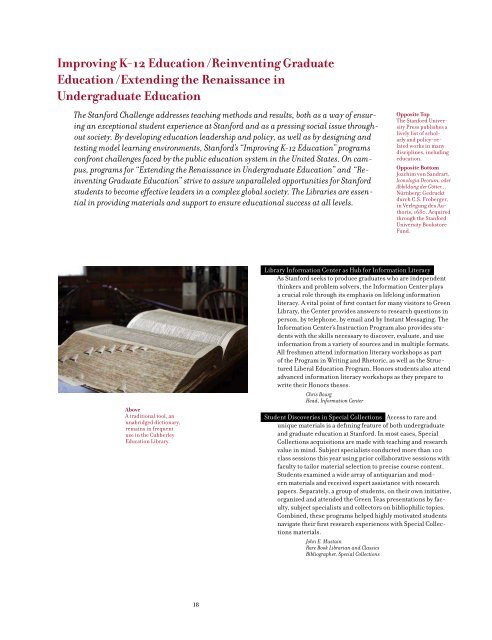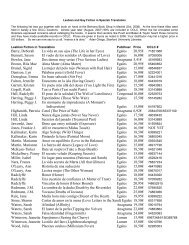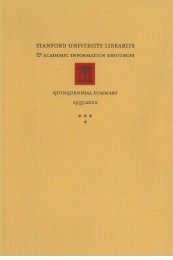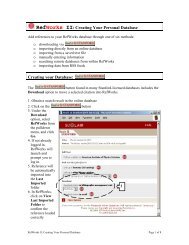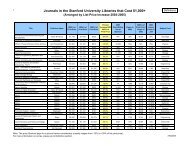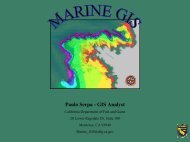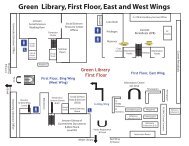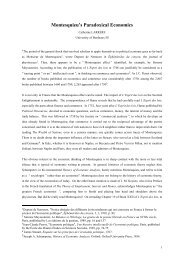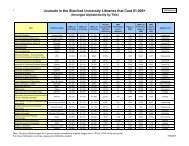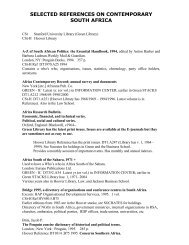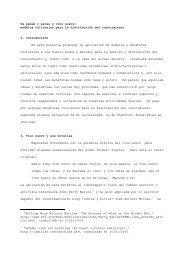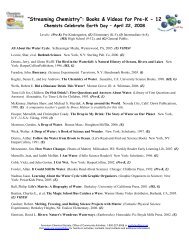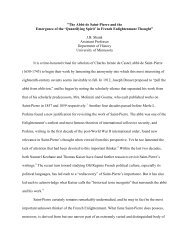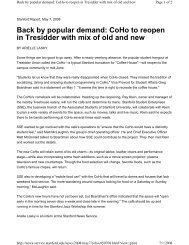The Challenge - Stanford University Libraries & Academic ...
The Challenge - Stanford University Libraries & Academic ...
The Challenge - Stanford University Libraries & Academic ...
Create successful ePaper yourself
Turn your PDF publications into a flip-book with our unique Google optimized e-Paper software.
Improving K-12 Education /Reinventing Graduate<br />
Education /Extending the Renaissance in<br />
Undergraduate Education<br />
<strong>The</strong> <strong>Stanford</strong> <strong>Challenge</strong> addresses teaching methods and results, both as a way of ensuring<br />
an exceptional student experience at <strong>Stanford</strong> and as a pressing social issue throughout<br />
society. By developing education leadership and policy, as well as by designing and<br />
testing model learning environments, <strong>Stanford</strong>’s “Improving K-12 Education” programs<br />
confront challenges faced by the public education system in the United States. On campus,<br />
programs for “Extending the Renaissance in Undergraduate Education” and “Reinventing<br />
Graduate Education” strive to assure unparalleled opportunities for <strong>Stanford</strong><br />
students to become effective leaders in a complex global society. <strong>The</strong> <strong>Libraries</strong> are essential<br />
in providing materials and support to ensure educational success at all levels.<br />
Above<br />
A traditional tool, an<br />
unabridged dictionary,<br />
remains in frequent<br />
use in the Cubberley<br />
Education Library.<br />
Opposite Top<br />
<strong>The</strong> <strong>Stanford</strong> <strong>University</strong><br />
Press publishes a<br />
lively list of scholarly<br />
and policy-related<br />
works in many<br />
disciplines, including<br />
education.<br />
Opposite Bottom<br />
Joachim von Sandrart,<br />
Iconologia Deorum, oder<br />
Abbildung der Götter…<br />
Nürnberg: Gedruckt<br />
durch C.S. Froberger,<br />
in Verlegung des Authoris,<br />
1680. Acquired<br />
through the <strong>Stanford</strong><br />
<strong>University</strong> Bookstore<br />
Fund.<br />
Library Information Center as Hub for Information Literacy<br />
As <strong>Stanford</strong> seeks to produce graduates who are independent<br />
thinkers and problem solvers, the Information Center plays<br />
a crucial role through its emphasis on lifelong information<br />
literacy. A vital point of first contact for many visitors to Green<br />
Library, the Center provides answers to research questions in<br />
person, by telephone, by email and by Instant Messaging. <strong>The</strong><br />
Information Center’s Instruction Program also provides students<br />
with the skills necessary to discover, evaluate, and use<br />
information from a variety of sources and in multiple formats.<br />
All freshmen attend information literacy workshops as part<br />
of the Program in Writing and Rhetoric, as well as the Structured<br />
Liberal Education Program. Honors students also attend<br />
advanced information literacy workshops as they prepare to<br />
write their Honors theses.<br />
Chris Bourg<br />
Head, Information Center<br />
Student Discoveries in Special Collections Access to rare and<br />
unique materials is a defining feature of both undergraduate<br />
and graduate education at <strong>Stanford</strong>. In most cases, Special<br />
Collections acquisitions are made with teaching and research<br />
value in mind. Subject specialists conducted more than 100<br />
class sessions this year using prior collaborative sessions with<br />
faculty to tailor material selection to precise course content.<br />
Students examined a wide array of antiquarian and modern<br />
materials and received expert assistance with research<br />
papers. Separately, a group of students, on their own initiative,<br />
organized and attended the Green Teas presentations by faculty,<br />
subject specialists and collectors on bibliophilic topics.<br />
Combined, these programs helped highly motivated students<br />
navigate their first research experiences with Special Collections<br />
materials.<br />
John E. Mustain<br />
Rare Book Librarian and Classics<br />
Bibliographer, Special Collections<br />
Curriculum Resources for Teachers Cubberley Library serves the<br />
School of Education, a leading center of educational research,<br />
to improve K-12 education in the United States. <strong>The</strong> continually<br />
expanding Cubberley Curriculum Collection includes<br />
hands-on science kits, newly published textbooks, and a wide<br />
range of the best in children’s literature to support language<br />
arts instruction. <strong>The</strong> Library recently revised its Web pages,<br />
using an open source content management system known as<br />
Drupal, to give better access to library resources. Additionally,<br />
new pages were created to serve the <strong>Stanford</strong> Teacher Education<br />
Program, a nationally renowned, innovative program<br />
leading to a Master of Arts in Education and a preliminary<br />
California teaching credential. Electronic resources, in addition<br />
to on-site books and journals on educational reform<br />
and teaching methods, are frequently consulted by members<br />
of the <strong>Stanford</strong> community as well as by local elementary and<br />
secondary teachers.<br />
Kathryn M. Kerns<br />
Head, Cubberley Education Library<br />
Advances in Information Technology Through <strong>Academic</strong> Computing,<br />
<strong>Stanford</strong> <strong>University</strong> <strong>Libraries</strong> & <strong>Academic</strong> Information<br />
Resources provides faculty and students with technology,<br />
expertise and resources to support learning, research and<br />
teaching. <strong>The</strong> Student Computing unit provides technology<br />
enhanced labs and classrooms in <strong>Stanford</strong>’s 77 student residences,<br />
Meyer, Green and the branch libraries, and Tresidder<br />
Student Union, as well as consulting, technology help, and<br />
training for <strong>Stanford</strong>’s students. <strong>The</strong> Faculty Services unit<br />
hosts <strong>Academic</strong> Technology Specialists to work with faculty on<br />
their use of technology in teaching and research, an <strong>Academic</strong><br />
Technology Lab, and provides CourseWork, the campus<br />
course management system. <strong>The</strong> Digital Library Systems<br />
and Services unit operates technology services, systems and<br />
infrastructure for the <strong>Stanford</strong> <strong>University</strong> <strong>Libraries</strong>, including<br />
the library management system and component parts, Web<br />
and access systems, digitization lab software, and the core<br />
server, database, storage, backup and Web infrastructure. As<br />
the <strong>Libraries</strong> move to an increasingly digital profile, <strong>Academic</strong><br />
Computing provides and manages digital resources<br />
for the <strong>Libraries</strong> through their complete lifecycle, including<br />
digitization, metadata design, specification and generation,<br />
digital preservation, online discovery and access, and overall<br />
management of digital materials.<br />
Lois Brooks<br />
Director, <strong>Academic</strong> Computing<br />
<strong>University</strong> Publishing Promotes Educational Research<br />
In line with its ongoing efforts to develop a publishing program<br />
that supports and complements the academic strengths<br />
and intellectual mission of the <strong>University</strong>, <strong>Stanford</strong> <strong>University</strong><br />
Press has published a core list of titles covering the breadth of<br />
education research, from pre-school and K-12 through higher<br />
education at both the undergraduate and graduate levels. <strong>The</strong><br />
Press has published prominent authors from the <strong>Stanford</strong><br />
School of Education and sought cutting-edge research that<br />
will improve our nation’s public education system, inform<br />
scholars and students, and educate our future leaders. Our<br />
commitment to education research will continue and grow in<br />
coming years, with education now being a major focus of our<br />
acquisitions.<br />
Geoffrey R. H. Burn<br />
Managing Director,<br />
<strong>Stanford</strong> <strong>University</strong> Press<br />
Clarifying Copyright for Books Copyright law has become a pressing<br />
issue as libraries and businesses develop plans to digitize<br />
materials and make works in the public domain widely available.<br />
In April, the <strong>Stanford</strong> <strong>University</strong> <strong>Libraries</strong> released the<br />
Copyright Renewal Database, dubbed the “Copyright Determinator,”<br />
which was developed under a grant from the Hewlett<br />
Foundation. Available on the <strong>Libraries</strong>’ public Web site, the<br />
Determinator brings all 1923-1963 U.S. book-renewal records<br />
together in a single database and, more significantly, makes<br />
searchable renewal records that had previously been distributed<br />
only in print. <strong>The</strong> <strong>Stanford</strong> <strong>Libraries</strong> are pleased to be<br />
able to offer this service to the scholarly community and are<br />
working with national partners to integrate this data into a<br />
much broader system for the analysis of copyright status.<br />
Mimi Calter<br />
Executive Assistant to<br />
the <strong>University</strong> Librarian<br />
18 19


